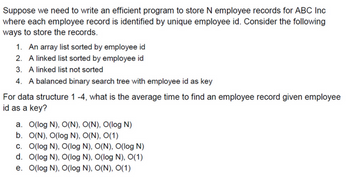Question
I was told the answer is O(log N), O(N), O(N), O(log N) but I am not sure

Transcribed Image Text:Suppose we need to write an efficient program to store N employee records for ABC Inc
where each employee record is identified by unique employee id. Consider the following
ways to store the records.
1. An array list sorted by employee id
2. A linked list sorted by employee id
3. A linked list not sorted
4. A balanced binary search tree with employee id as key
For data structure 1-4, what is the average time to find an employee record given employee
id as a key?
a. O(log N), O(N), O(N), O(log N)
b. O(N), O(log N), O(N), O(1)
c. O(log N), O(log N), O(N), O(log N)
d. O(log N), O(log N), O(log N), O(1)
e. O(log N), O(log N), O(N), O(1)
Expert Solution
This question has been solved!
Explore an expertly crafted, step-by-step solution for a thorough understanding of key concepts.
This is a popular solution
Trending nowThis is a popular solution!
Step by stepSolved in 3 steps

Knowledge Booster
Similar questions
- Prove a) 1000000n2 + 0.0000001n5 is Ω(n3) b ) n! is Ω(2n) if you use an example c and n PLEASE EXPLAIN WHY YOU CHOSE ITarrow_forwardFor each of the following expressions, find if they are O(1), O(2"), O(n²), O(log n), O(n2022), O(n log n) or O(n): (i) 2022 + 15 log n (ii) 42 n + 5 n² + 2n log n (iii) n log n + 2" + n2022 + 500n Briefly explain your answer in each case.arrow_forwardDear Sir/Madam, May I get an explanation how the computation was obtained?I do understand why the input size is squared for O(n2) 30002 / 10002 I just don't know where the idea to square the denominator comes from?The same for the n * log(n) solution. Also what topic of Maths deals with calculations of this kind? I would like to learn more to be able to solve similar problems.arrow_forward
- (2) Algorithm f(n) if n==1 return 1; return 2*f(n-1)+ n*n*n;arrow_forwardUsing whatever method you want, find and prove the answers to the following- a) T(n) = 3T(n /3) + n/2 b) T(n) = 4T(n/2) + n° 2 c) .T(n) = 4T(n/2) + narrow_forwardWhich of the following are true, explain why: 1. log(n) = 0(n) 2. n= 0(log n) 3. log? (n) = O(n) 4. n= 0(log?n) 5. log(n) = Q(n) 6. n = Q(log n) 7. 5n3 + 7n + 13 = 0(n5) 8. 5n3 + 7n + 13 = Q (nº) 9. 5n3 + 7n + 13 = Q (n) 10. log(n!) = 0 (nlog (n)) 11. n/2 = O(log n) 12. 2" = 2(n!)arrow_forward
arrow_back_ios
arrow_forward_ios